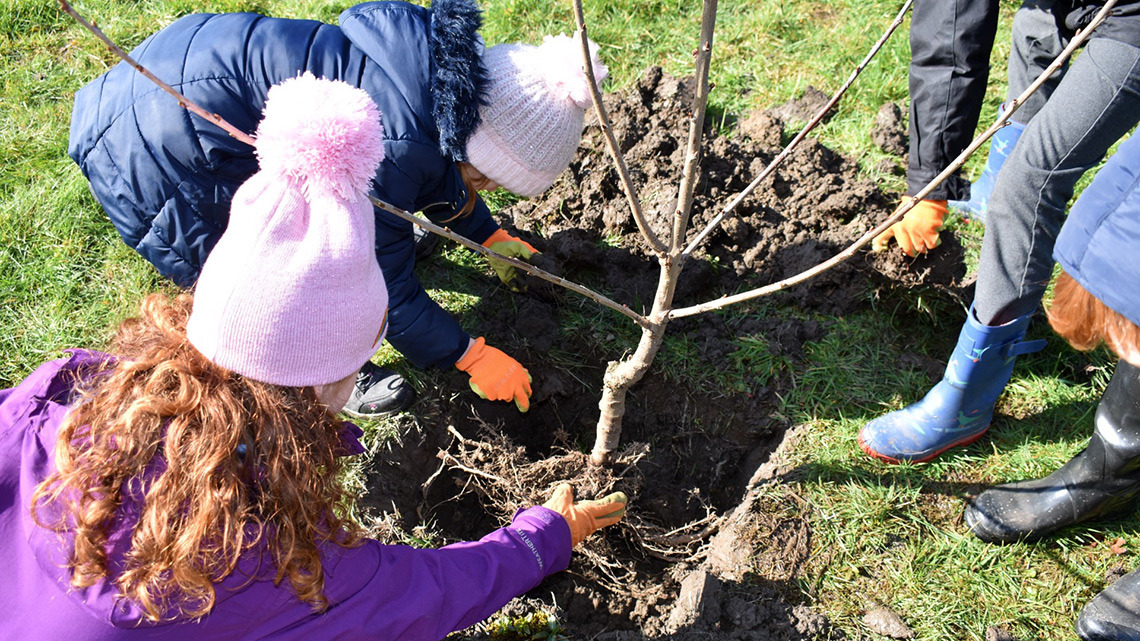The Laudato Si' Centre provides a space for practical action to care for our common home. It is a statement of hope, aflood with signs of ecological activity, rooted in the belief that all of us can make a difference.

Diocese of Salford
During Lent 2019, Bishop John Arnold, Lead Bishop for the Environment, wrote to parishioners and schools throughout the Diocese of Salford, asking people to make changes in their lives, no matter how small, that would make a difference to the environment. Not content to simply challenge others, Bishop Arnold decided to lead by example and make the diocese a “flagship for effective action on climate change”. He then began a major environmental project on the grounds of his residence at Wardley Hall – the Laudato Si’ Centre.
The Centre is a statement of hope – rooted in the belief that all of us can make a difference.
The grounds of Wardley Hall are now aflood with signs of ecological activity; polytunnels and greenhouses for growing fruit and vegetables, an orchard and forest gardens, all provide growing spaces that demonstrate the interconnectivity that exists between humanity and nature. This interconnectivity is further demonstrated by the approximately 60,000-strong bee population that has been cultivated on the grounds, complete with volunteer beekeepers harvesting honey that is now sold around the area.
These developments have not only made the grounds of Wardley Hall more eco-friendly but have also provided an opportunity for others to come and find inspiration for ways they can make their own contribution to protecting God’s creation. Bishop John has embraced this interest, welcoming visitors of all faiths and none to visit the grounds and make their own contribution.
Before lockdown, the Laudato Si’ Centre held its first eco-conference, with representatives from 18 primary schools in attendance. This gave students a wonderful opportunity to share their passion for the environment, as well as the work they have done within their own school to care for creation and live more sustainably. Further opportunity for students to engage with the Laudato Si’ Centre has been achieved though the construction of a classroom for visitors made out of ‘eco bricks’, plastic bottles that are packed with used plastic to create a level of density before they serve as reusable building blocks.
The Laudato Si’ Centre has also worked to engage people across the diocese through initiatives like ‘Envirolent’, where a range of materials were produced to help people to use the season of Lent as a time of reflection on our own roles in caring for the environment. It has also produced educational materials for schools on ways they can care for creation. There have even been competitions, including one to design a logo for the Laudato Si’ Centre that received more than 500 entries and a nature photography competition that received over 300 entries.
Head of Environment for the Diocese of Salford, Emma Gardner, is pleased with the environmental network that has been built across the diocese, allowing parishes, local businesses, schools, colleges, and charities to engage with each other. While the COVID-19 pandemic has offered significant challenges for the Laudato Si’ Centre, they hope that their garden, which serves as a place for prayer and contemplation, will be a place for people to heal after the pandemic.
A group comprising of schoolteachers, Laudato Si’ Centre staff and colleagues from the Diocese’s Department of Education are currently developing materials for schools to use over the next academic year. Funds have been raised to build a fire pit and raised beds, install solar panels on the outdoor classroom and site a weather station, all of which will support educational programmes. They have also received planning permission to convert the former coach house and stable block at Wardley Hall into a Laudato Si’ Centre building, construction of which is expected to take about 18 months and will be done sustainably. They also plan to expand their environmental network and connect with projects across Salford and other dioceses, sharing stories of how they can live out their ecological conversion. There are also focus groups running to help plan more activities in the future. As Emma Gardner says, there is “a lot of listening happening”.
The Laudato Si’ Centre began as a project to create awareness and inspire action, giving people an idea of what they can do in their own lives to make a difference and to show their love of God and creation. In this task they have certainly succeeded so far, and the future for the project looks even brighter.
To learn more about the Laudato Si’ Centre, visit its website.